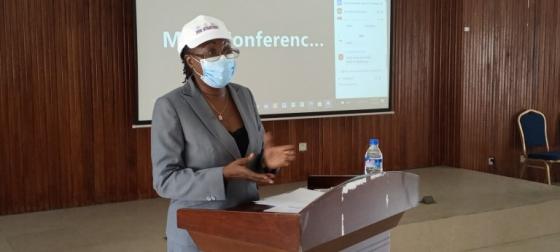MOH Develops Road Map for Private Health Sector

The Ministry of Health (MOH) has rolled out a two-year strategy aimed at developing the Private health sector of Liberia.
The strategy titled, Private Sector Engagement Strategy (PSES), according to health authorities, will support the health sector in achieving national health goals.
Moreover, health authorities have said that the strategy is designed to structure engagement between the Ministry of Health and the private health sector as well as to seek the strengthening of the private health sector.
Even though engagement between the Ministry of Health and the private health sector has a long history, this strategy aims to structure collaboration and dialogue between the two parties to achieve common long-term objectives.
Speaking at the program recently, in Congo Town, Health Minister, Dr. Wilhelmina Jallah told the gathering that the document was drafted through a series of consultations with stakeholders from across the Ministry of Health and within the private health sector.
She also indicated that the document considered areas of collaboration identified as those of mutual interest to both sectors.
Dr. Jallah, who also served as the chief launcher of the strategy, outlined the significant progress being made by the Ministry under her watch relative to annexing smooth collaboration and coordination between both sectors.
“It is important we have this collaboration because the private sector is a major contributor to what’s happening in the government sector. If you don’t have a well-organized private sector, things will be going but not well,” she said emphatically.
The private health sector has grown from 2 percent to 8 percent of total health expenditure over the 2015-2018 period. Thus, Dr. Jallah said that it shows that private health facilities in Liberia represent 37 percent of the national healthcare market, with representation increasing to 80 percent in urban areas.
The Minister in her remarks noted that the level of penetration of the private sector varies greatly by county, with most of the private health sector situated in Montserrado County.
“Any effective and sustained effort to leverage the private sector presents an opportunity for enhanced access to quality services, particularly in urban areas where most of the private sector operates,” she noted.
Giving the importance of the launch, Assistant Minister for Policy Planning at the Ministry of Health George Jacobs emphasized that the Ministry wants to train health workers in the private sector so they can be on the path with their colleagues in the public sector.
“So these things we are working on to see how to strengthen the private sector to achieve quality in the attainment of universal health coverage.”
Having launched the private sector engagement strategy, he said moving forward will provide an opportunity for the private sector to help MOH in the health sector so that it can expand its scope of operations.
The Ministry he said needs the private sector and if it should have a wider scope for family planning, among several other activities that are out there then they have a role to play—in the same way.
The keynotes speaker underscored the need for both parties to work together in the common interest of the Liberians, through the provision of quality healthcare services that would meet the universal health benchmark.




